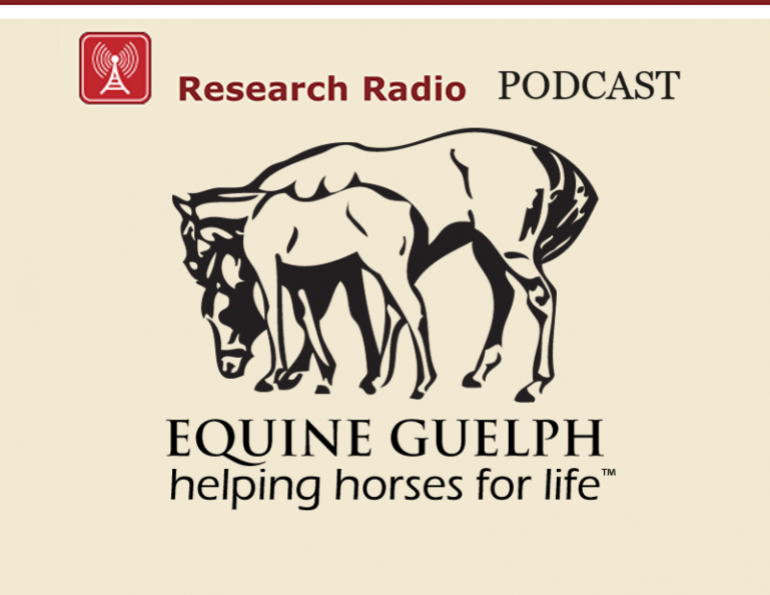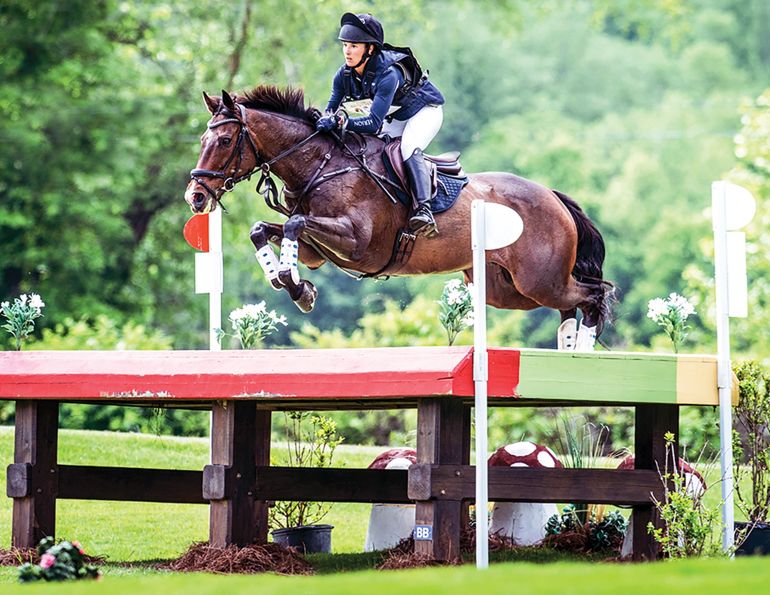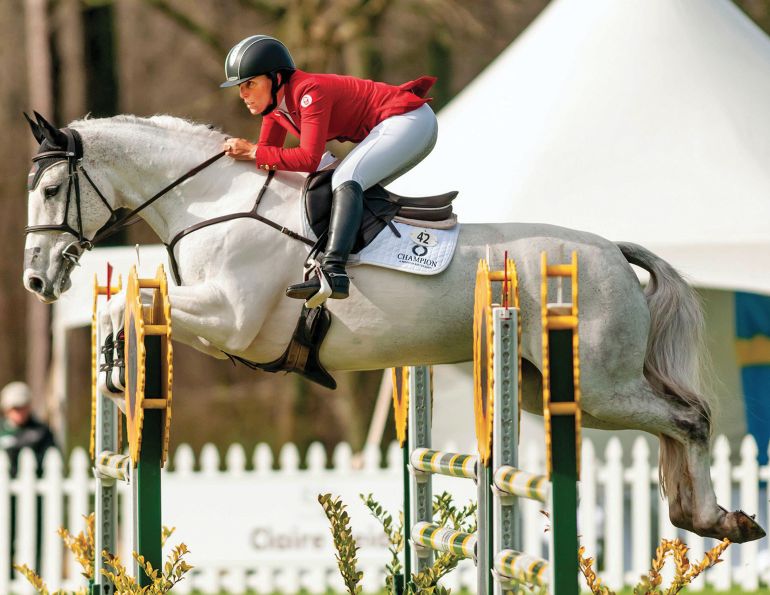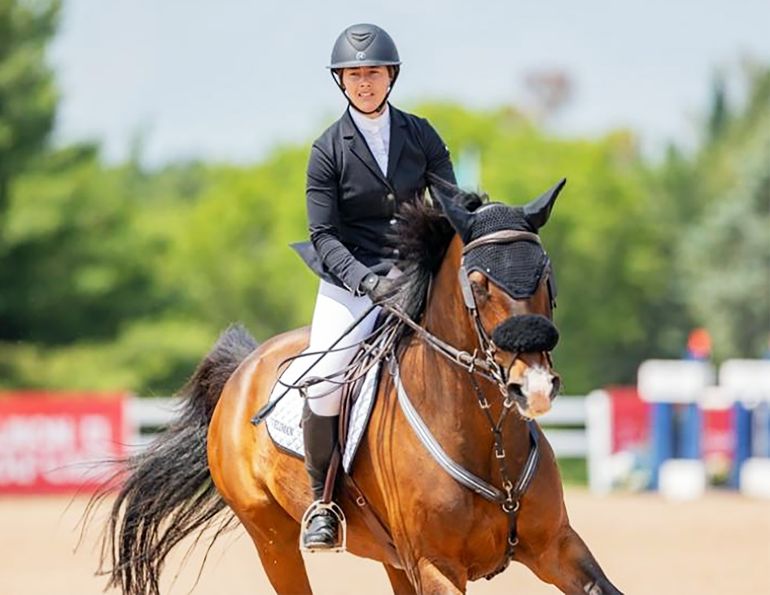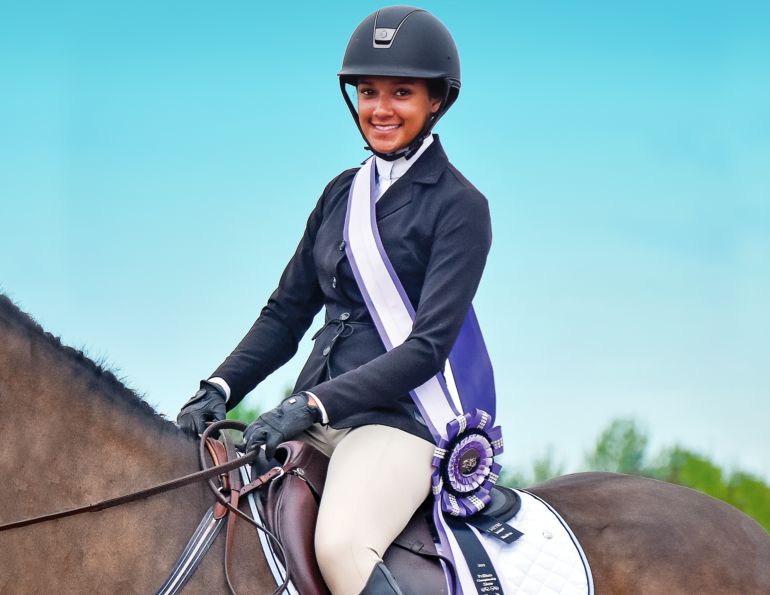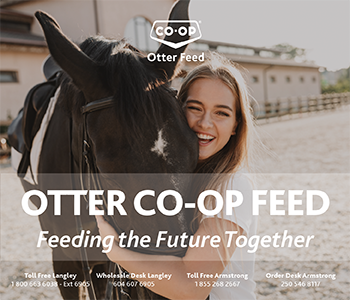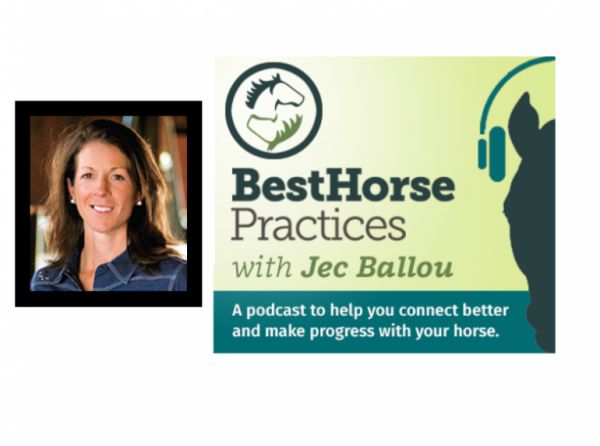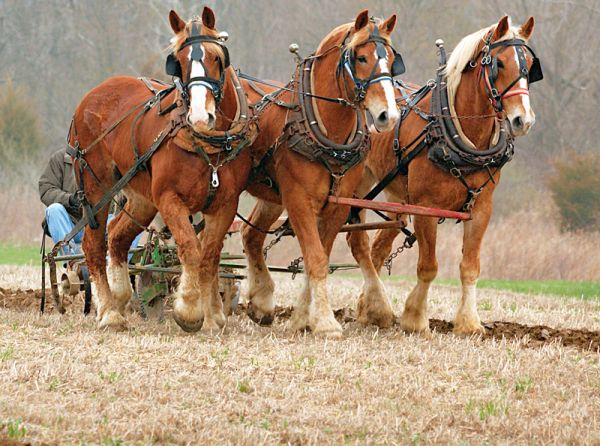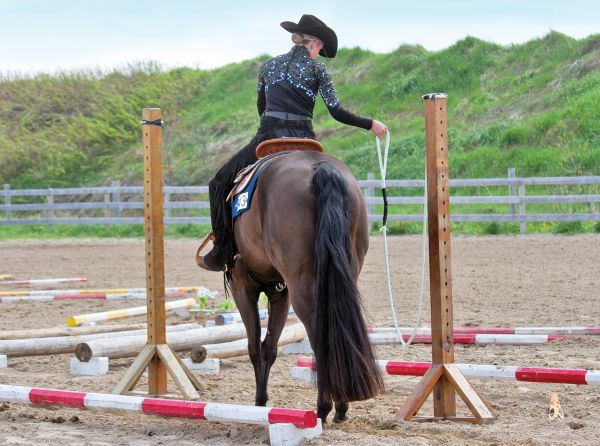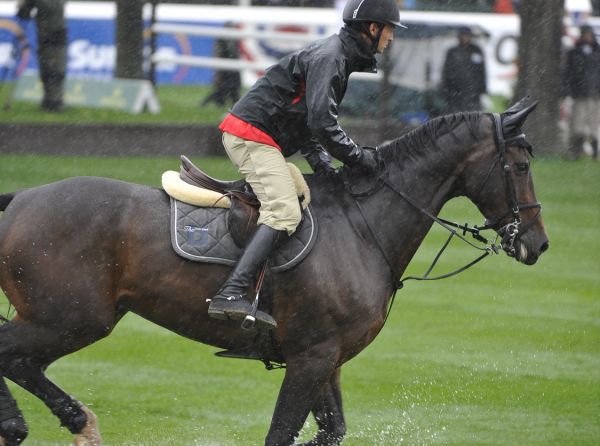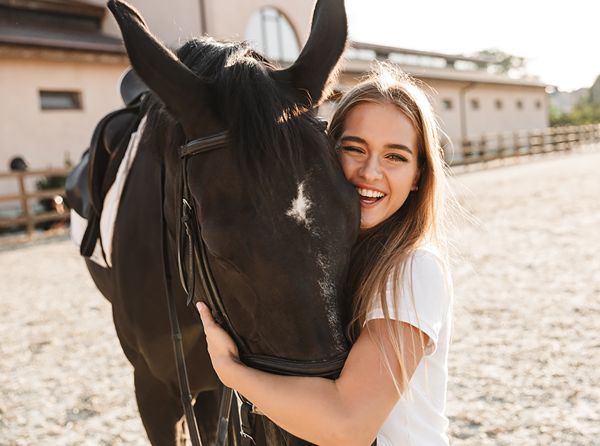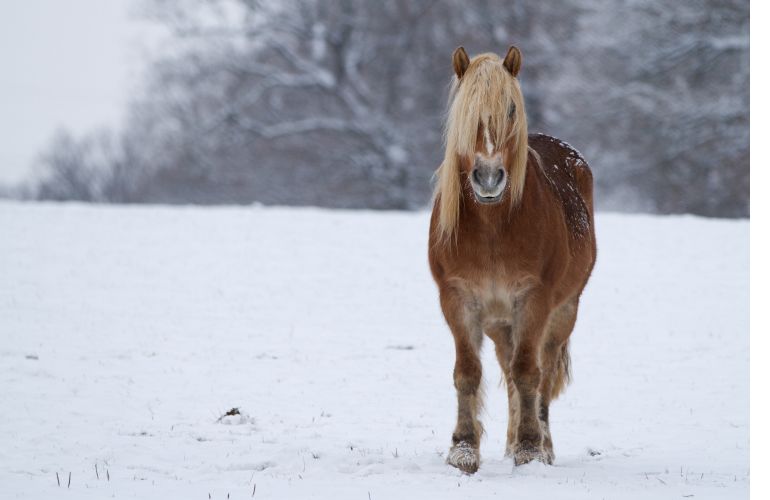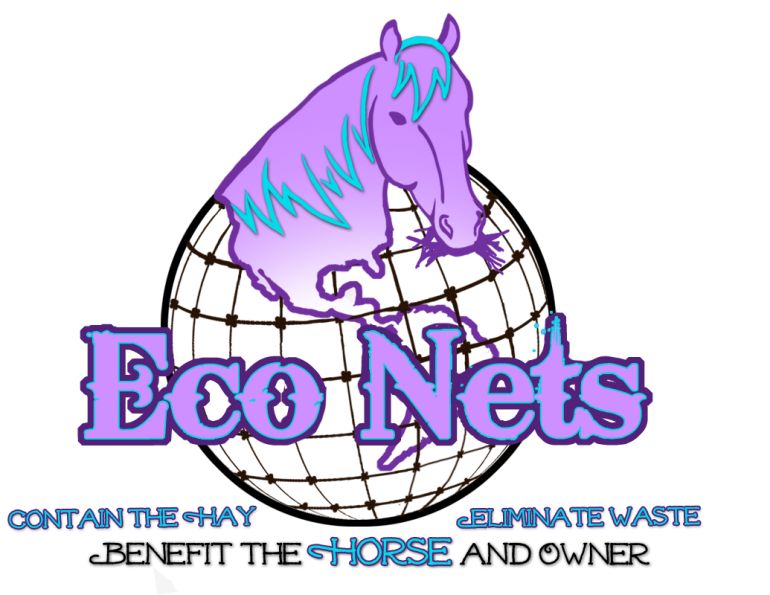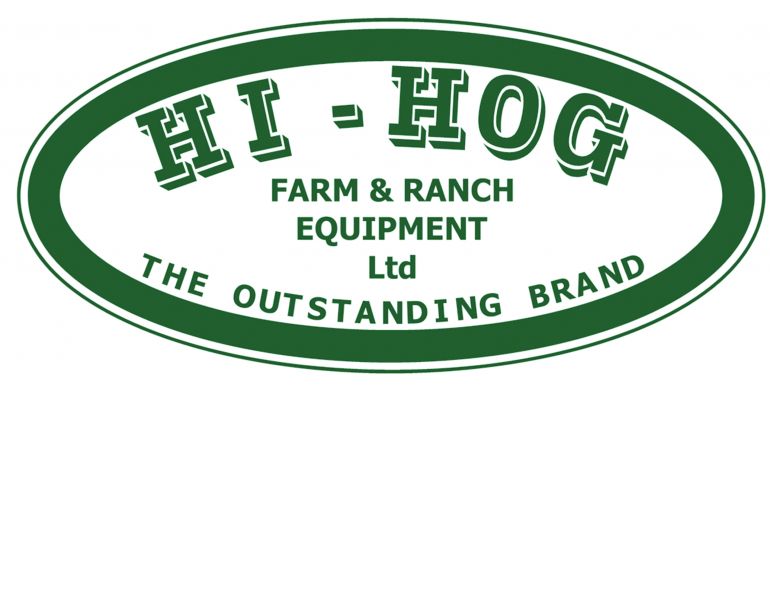Interviewed by Jess Hallas-Kilcoyne
Growing up in Lakefield, Ontario, Jaimey Irwin always knew he would ride and train horses professionally, settling on dressage as his discipline of choice at age 16. Today, at 35, he has become one of the most successful Grand Prix dressage riders representing Canada on the international stage. The highlight of Jaimey’s riding career to date occurred at the 2013 Reem Acra FEI World Cup Dressage Final in Gothenburg, Sweden. Competing against the best dressage riders from around the world, Jaimey achieved an impressive 16th place finish riding Lindor’s Finest (Lindor), a 16-year-old Dutch Warmblood gelding.
Jaimey’s success as a dressage rider is matched by that of his wife, 2011 Pan Am Games team silver medalist Tina Busse-Irwin. Together, Jaimey and Tina balance raising their two-year-old son, Gavin, with sharing the daily riding and coaching responsibilities at Stoney Lake Equestrian, their dressage training and sales facility located at Strathfield Farm in Stouffville, Ontario.
Recently, I got the chance to speak with Jaimey about his incredible experience at the World Cup, what it’s like to go to work every day alongside his wife, his riding inspirations, and the aspect of his riding he’d like to improve. Here’s what he had to say…
Jess Hallas-Kilcoyne: I read on your website that your future goals were to represent Canada at the World Cup, Olympic Games, and World Equestrian Games. How does it feel to have knocked off one of the three?
Jaimey Irwin: I would like to continually represent Canada at those events, but to be able to tick one off the list is a great accomplishment and I’m very happy about that. It makes me hungry for more competitions of that calibre.

Grand Prix dressage husband and wife team Jaimey and Tina share the riding, training, and coaching responsibilities at Stoney Lake Equestrian, located at Strathfield Farm in Stouffville, Ontario. Photo courtesy of Jaimey Irwin
JHK: You must have been absolutely thrilled with a 16th place finish, especially since it was your World Cup debut.
JI: I was extremely happy. It was the strongest field of competitors that I can ever remember them having at the World Cup. To be able to compete in that company was really quite amazing.
JHK: What goes through your head just before you’re entering the ring at an event like the World Cup?
JI: It was my first time competing in Europe and my second time competing in an indoor facility. It was an unbelievable feeling to ride in underneath the light in front of thousands of people watching you – a little nerve wracking but at the same time exciting.
JHK: How long have you been riding Lindor?
JI: I’ve been riding him for about a year. He’s co-owned by my mother-in-law (Ute Busse) and Sally Carlton. He was Ute’s horse to compete and she asked me if I would take him over.
JHK: When you first began riding Lindor, was the World Cup a goal for you at that point?
JI: It actually wasn’t. I had been coaching Ute on him before that, and then she wanted me to take him on and see how I did in the Grand Prix with him. And we actually did very well at a few competitions and at Dressage at Devon. Evi Strasser came to me and said, “That was really good. You should really try for the World Cup.” And I thought, “Oh, okay. That would be a neat goal.” We did a little bit of fundraising so that I could go down to Florida for six weeks and do a few of the CDI-W (World Cup qualifier competitions) and it worked out that I was able to go to the World Cup.
To have Lindor in the World Cup was a great accomplishment. He’s Canadian bred, born, and developed, and has been able to go to Europe and represent Canada. It’s very, very unique. Most of the other horses at that level have been imported from Europe. He wasn’t so that’s pretty cool.
JHK: Can you tell me a little bit about Lindor’s personality?
JI: Ute bought him as a stallion when he was six, so he was a bit wild. You couldn’t have another horse in the arena at the same time if he was in here. But they gelded him and that helped a lot. Now he’s a really, really easygoing guy. He’s a great horse and I would never call him unruly – he’s kind of the opposite. He’s a big teddy bear.

In April 2013, Jaimey Irwin finished in 16th place in his World Cup debut riding Lindor’s Finest, a 16-year-old Canadian-bred Warmblood gelding co-owned by Irwin’s mother-in-law, Ute Busse. Photo courtesy of Jaimey Irwin
JHK: What would you consider Lindor’s strengths and weaknesses to be?
JI: The biggest challenge for him is to have electricity. You have to create that electricity for him. But in a competition atmosphere, he really rises to the occasion but doesn’t boil over the top. He’s a beautiful looking horse, he’s a very nice type, he’s very, very kind, he has a super character, he’s a good mover…there’s not much to say about his weaknesses. He’s just a super horse and a very good boy. He’s able to go to the World Cup and he’s also very safe. He’s actually the only horse that my two-year-old son will sit in front of me on.
JHK: What has been your proudest accomplishment in your 20 years as a rider, trainer, and coach?
JI: I’ve had a lot of things that I’m proud of. I’m proud of being able to compete at the World Cup Finals. That was probably one of my biggest accomplishments at that level. Also, for the 2011 Pan Am Games, my wife and I both qualified for the Canadian team on the same horse. Tina had the ride on the horse so I was coaching her and another student of mine, Roberta Byng-Morris, at the Pan Am Games and they won the team silver medal. That was a great accomplishment as well. And we’ve had many junior and young rider students competing at the North American Junior and Young Rider Championships.
JHK: How do you enjoy working so closely with your wife on a daily basis?
JI: We work really well together. We’re very professional and see each other’s point of views and work things out for the best results. If I’m not here, then she’s there also to keep things going, and if she’s not here, then I’m here to do the teaching. We always have a back-up if one of us isn’t going to be here. The people at our stable are also very, very good at being comfortable with both of us helping them.
JHK: To be able to successfully share students I assume that you and Tina must also share a similar training philosophy. If so, how would you sum up that philosophy?
JI: I would pay very close attention to the basic principles of dressage, building a very strong base in the horse, always making sure the quality of the horse’s gaits is the primary focus. You always want to be enhancing the quality of gaits in the horse’s way of going. Also, we don’t want to push the horses past what they can do. Many horses have limitations and we’re good at recognizing that and keeping them at a level where they’re very comfortable with what they do so we’re not making them sour. Basically we want to build the horse with the mindset that the overall idea of dressage is that the horse is really able to dance. That is my idea of what dressage should be.
JHK: What riders or trainers do you consider inspirational?
JI: I’ve always admired Isabell Werth. She’s probably one of my biggest idols. She’s a very, very good rider, she’s a super trainer, and I have to say, to be able to compete against her at the World Cup was a great experience. Seeing her working behind the scenes in the warm-up and then going into the ring was great to watch. I’d definitely seen her as a spectator, but never as a fellow competitor.
I’d also say my long-time trainer Holger Münstermann. I’ve been riding with him for 13 years so he has been very influential in my riding and training.
JHK: What do you feel are your greatest strengths as a rider, trainer, and coach?
JI: As a rider, it’s nice being able to work all different types of horses at all the different levels. I’ve always had to deal with difficult horses and so I do know how to ride difficult or sensitive horses.

As much as he loves competing and hopes to continue to represent Canada in international competition, Jaimey also gets immense satisfaction out of seeing his students succeed. Jaimey is pictured here with student Camille Frechette at the 2012 North American Junior and Young Rider Championships, where Camille was part of the bronze medal winning Young Rider team from Quebec. Photo courtesy of Jaimey Irwin
JHK: What do you look for in an upper level dressage prospect?
JI: Definitely rideability is number one. They can be as talented as you want, but if they don’t allow you to ride them properly then you’re never going to get anywhere. They have to have three good gaits that are very solid and have the ability to be developed. We like horses with a good, strong character. We feel that’s always an asset because when they really get working for you, they push a little bit harder naturally. It’s also important that they’re built well and are strong.
JHK: Of all the horses you’ve worked with over the years, are there any that stand out as having been extra special for you?
JI: Lindor’s been special because he’s been quite fun to ride. He’s a horse that you feel you can really go and ride to be competitive with which is something I really haven’t had on a consistent basis. Some horses, you have to manage them around the test or not do things to the full extent because you know they could unravel very quickly. But Lindor is the type of horse that you can really go to compete with and ride each movement to the best of his ability.
My other horse, Dover, is one that I’ve ridden and competed internationally at Grand Prix. He’s a really cool character, but he was also a very difficult horse, a strong horse, and a very high energy horse in the beginning. But now he’s really changed. I teach lessons on him now and he’s a great horse for teaching people.
Another horse that I had was named Waldano. He was a really funny horse. He was crazy over food. He’d see you coming and he’s just start drooling until there was a pool of drool on the ground because he knew you’d have a treat for him. When I first saw him in Europe nobody wanted him because he had an extremely bad walk and he was very spooky. But I quite liked him and got along with him well, and was able to develop the walk to the point where he was getting quite decent scores in the walk. I competed him internationally at the small tour level. Then he became a schoolmaster for our students. He was a very special horse.
JHK: Of the other horses out there right now competing at the international Grand Prix level, which one would you most like to ride?
JI: I have to say I quite like Damon Hill, the horse that won the World Cup. He’s quite a nice horse – three very nice gaits, a beautiful type, looks like a very honest boy, and he seems like he would be a neat horse to ride.
JHK: What do you struggle with as a rider, or what do you focus on improving in your own riding?
JI: I think mental training is a very, very big part of competing because it takes not even two seconds for your head to remember something that happened this one time or anticipate the horse doing something, and then it happens. Those types of things I find are the most challenging for me – to keep my head clear and not let it go back to that place where you think that there’s going to be a problem.
JHK: What are your goals for the future?
JI: I would love to compete in as many Olympic Games, World Equestrian Games, World Cups, and Pan Am Games as possible, as well as have students competing at that level. I really enjoy teaching and coaching and training as well as competing. It’s really gratifying for me to see my students do well and become successful.
For more information about Jaimey Irwin and Tina Busse-Irwin, visit www.stoneylakeequestrian.ca.
This article originally appeared in the July 2013 issue of Canadian Horse Journal.
Main Article Photo courtesy of Jaimey Irwin





